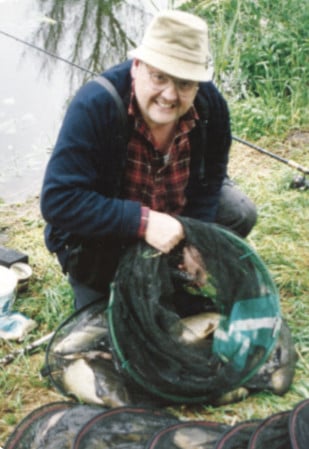The well-attended funeral took place on Thursday of retired High Bailiff, Coroner of Inquests and Acting Deemster, Thomas Michael Moyle.
Michael, born in Radford, Coventry to Thomas, an engineer in the aeronautical industry and Margaret a noted cook and seamstress was the second son of the family with an elder brother, Tony, and a younger sister, Nita.
Michael had the good fortune to be raised in a close, supportive and loving family environment and his parents instilled the importance of education and lifelong learning into all three of their children but with no pressure - saying: ’try your best, you can do no more’.
This philosophy stayed with Michael and he was always interested and had infinite patience both in work and personal domains in helping, with understanding, the development of colleagues and friends.
As youngsters Michael and his brother Tony were enrolled into the angling section of the Jaguar and Daimler Sports and Social Club and they visited the club’s stretch on the River Avon which triggered Michael’s love of angling and provided him with a great outlet for necessary relaxation in later life.
In those early days there were many fishing trips to the canal where members, including Michael, sat in the pub dangling their lines out of the window. He clearly took to the convivial atmosphere which sowed a seed for the future at The Gentleman’s Bar at the Woodie!
Michael attended King Henry VIII Grammar School and never really had to study hard but delighted in discovering new things and solving problems for others by looking at things from different angles; a skill he took into later life both in his career and friendships.
After gaining his degree, Michael lectured at Aston University while ’dining in’ at the Inns of Court in London, namely Grays Inn, a requirement of barrister training. He then moved to chambers in Nottingham and worked as a young barrister there from 1970 to 1973.
Coincidentally Nottingham was the area in which the former clerk to the justices of the Isle of Man, the late David Jones, was also working at the time and David said that Michael’s talents in the law were obvious at that early stage.
 In 1974 an interesting opportunity came up for Michael in the Isle of Man when he was successful in applying for the post of Government Advocate within the Attorney General’s Chambers, a much more compact affair to how it is today.
Michael joined Chambers around the time when His Honour the late Jack Corrin was made Attorney General and at the time of Michael’s retirement Deemster Corrin described Michael as ’totally reliable and decisive with a quick brain and as the Head of Crown prosecutions ran an efficient and prompt operation; fair in all his dealings’.
However, it was not just the prosecution work that Michael was engaged in and, with the exception of a few civil cases that the AG himself wished to do, Michael appeared in court for the government on everything else, the variety suiting Michael’s enquiring mind and he excelled in the role.
Success was not limited to the professional side and a major triumph was a romantic one.
Junemary and Michael met in court - she as an articled clerk and he the talented young advocate.
One evening he announced there was a party in Greeba and she could come if she liked. Of course she did and this led to a very happy marriage of 44 years in which Junemary says there was never a dull moment.
 In 1980 that superb lawyer the late Deemster William Cain replaced Jack Corrin as Attorney General upon Jack’s elevation to the high-court bench.
William Cain’s appointment was at the dawn of the great development of the law in the Isle of Man for which William was the driver.
To do so William needed a good team around him and he found that support in Michael.
At the time of Michael’s retirement His Honour William Cain said about Michael as government advocate he was ’fair but fearless, forthright but friendly, the best prosecutor ever to appear in the courts of the Isle of Man.
’He quickly made his mark and earned the respect of the advocates who appeared in the courts as his opponents. He usually secured a guilty verdict, but when a jury returned a verdict of not guilty, Michael always accepted it graciously.’
As the sole prosecutor until much later on, Michael was the person responsible for advising the police on every file that went to the Attorney General’s office and for every Court of General Gaol Delivery prosecution.
The Chief Constable, Gary Roberts, reminiscing recently on those days remarked that Michael had high standards and expected the same from everyone else.
In the chief constable’s opinion Michael was ’a brilliantly successful prosecutor’.
Michael remained in the role of Government Advocate until 1995 and, by the time he left after his 21 years’ service he had conducted in excess of 500 prosecutions before the Court of General Gaol Delivery. During that time there was not a single complaint regarding the service of the prosecutions department.
In 1995 Michael was appointed Deputy High Bailiff and joined High Bailiff Andrew Williamson (as he then was), and they made a very successful and efficient team in terms of dispensing justice in the summary courts. Michael valued Andrew’s wise counsel and guidance and upon Deemster Williamson’s elevation to the High Court bench in 2002 Michael was appointed High Bailiff having been an Acting Deemster since 1997.
As a judge Michael had a considerable social conscience with a strong sense of what is right and just.
Michael’s courts were never dull with his biting remarks, humour and fearless tenacity to call things-how-they-were despite the controversy that some of those remarks may have caused. Michael was never afraid of rocking the boat of officialdom if the boat needed rocking. Michael did not court popularity but his views, common sense and firm approach to sentencing were in tune with those of the man on the street.
While perceived as strict and taking a firm line, defence advocates encouraged their clients to go before him for a fair trial and he was greatly respected by court users including those he imprisoned. Michael was a man of the people and freely moved in society despite his high public profile.
His telephone number was in the phone book and he never refused to speak to anyone. One regular defendant when advised an alternative judge was hearing his case said: ’Where’s Mr Moyle? I always deal with Mr Moyle.’
Another member of Michael’s fan club was Orry, the famous Manx cat of Castle Rushen.
Michael particularly liked conducting his monthly petty session list in the  court room in the Castle and was very fond of Orry.
Orry, too, loved to attend such sessions and did so despite all attempts made by the staff to keep the cat out of court.
Orry was like a reverse Houdini, finding any method to escape into the courtroom when Michael was sitting.
On one particular day a defence advocate had rested his rather snuggly overcoat on a chair behind him and addressed the court admirably in mitigation.
During this oratory Orry, unbeknown to the advocate, stealthily approached and settled down in the overcoat.
Following the conclusion of the case the advocate picked up the coat causing the concealed Orry to leap through the air and the advocate to leap higher issuing a surprised Anglo-Saxon-based expletive.
Michael, suppressing his own laughter, instantly admonished the unfortunate advocate for the less than lawyerly language while everyone else in court was in stitches.
The role in which Michael particularly excelled was as coroner of inquests where he demonstrated compassion and empathy to the families who had lost loved ones often in very tragic circumstances.
It was not unknown for Michael to struggle to control his own emotions in delivering his conclusions.
In keeping with his constant desire to learn, and in the days before the internet, he asked his local GP and friend to provide an anatomical atlas for him to better understand the medical reports.
He was always determined that the families would have any questions answered and assisted them to obtain justice for their loved ones.
This was particularly clear with the Solway Harvester disaster when in January 2000 the scallop dredger from south west Scotland aiming to shelter in Ramsey Bay sank in very heavy seas 11 miles off the east coast of the island with the loss of all seven crew members.
The crew were  from the small fishing community in the Isle of Whithorn and three of the lost fishermen were from the same family.
Michael insisted the vessel be raised to recover the bodies and battled for many years to obtain the necessary evidence for a full and fair inquiry as to the cause of the tragedy.
That included travelling to Scotland to oversee the obtaining of formal evidence from the owner of the vessel in order to help bereaved families. Junemary later visited the Isle of Whithorn with friend, Jean, and they were moved by the high regard in which Michael was held by the villagers in recognition of his tenacity in battling the red tape and complacency.
A good sign of a person’s character can be gauged from how they are viewed by their staff.
To say that Michael’s permanent clerks were devoted to him is an understatement.
That’s not to say things were harmonious all the time in the office and on occasions there could be a frank exchange of views but Michael’s humour usually quickly restored it to a happy ship. Compassion and fairness but also that wit were evident throughout his career and the press reporters were always happy with his soundbites:
lThe Lada motorcar that had a tailwind when speeding;
lThe chickens that go cheap cheap when reduced at Shoprite
On one occasion Michael was sentencing an offender with literacy difficulties to probation with a condition aimed at improving those skills.
It was at a time when Michael was not seeing eye-to-eye with the local press, and he suggested to the probation officer that the reading material did not need to be complex, something like the Beano but, if that was too difficult, the Manx Independent!
Sartorial elegance was not Michael’s strong suit and Junemary gave up saying: ’You can’t go out looking like that!’
On one occasion, Michael suitably dressed in his scruffs, was supping a pint with the local newspaper in his hand, when a painter in splattered overalls tried to order a pint in The Woody.
Lorna, the scrupulous landlady at the time, said: ’I am sorry you cannot drink in here - this is The Gentleman’s Bar’, to which the painter replied: ’Then how did he get in?’
Lorna, drawing herself up to her full height, responded: ’Because that’s the High Bailiff!’
The Gentleman’s Bar provided a place to unwind for Michael between court and home.
The setting suited Michael’s immense ability as a raconteur and he will be greatly missed there by all his friends.
Michael retired from the office of High Bailiff in 2010 after 15 years as a full-time judge and he recognized that times had changed with the confines of modern practice less suited to his unique and straightforward approach.
He felt fortunate to have practised and presided when he did. It is fair to say there will never be another judge like Michael and many will say justice is the loser for it.
Over the years Michael and Junemary enjoyed many wonderful worldwide holidays together, but some of their very best holidays were spent peacefully coarse fishing in Ireland.
The highlight of their retirement, which Junemary and Michael considered their privileged time, was as visiting students at Harris Manchester College in Oxford, a college catering for over 21s i.e. mature students although, as Junemary says, the arrival of the Manx contingent certainly skewed the statistics towards the more mature end of the scale.
Michael liked to say that he was reading Victorian literature and Junemary was reading comics.
He was at home in the academic environment right from the start.
Michael loved the reading for his essays, slogged over the writing, and was at his best in the tutorials where the debate about the topic engaged him enormously. His irreverent approach to life coupled with his wit and sharp mind made him a joyful companion at all times for the students and staff alike.
Michael understood how some of these mature students struggled with their family responsibilities and funding while studying.
He was a great supporter of the college charity, the Junior Common Room Trust, which helps students with immediate funds for emergencies. His generosity has helped secure this lifeline for the future.
Michael’s support extended in so many ways to the students by sharing practical good sense, based on his rich experience of life, he helped put back many on the right path.
He was solid, dependable and down-to-earth; just the type of anchor the students needed in the often deep and impenetrable seas of academic life at Oxford.
Michael was immensely proud to have been elected both a Foundation Fellow of the College and a member of the Oxford and Cambridge Club.
On the death of a fellow the flag at the college is lowered to half-mast as a mark of respect. Michael said it was a pity he would not be able to see that.
The flag has indeed been at half-mast in his memory.
Michael had diverse interests outside work and was an avid reader.
He loved to read Shakespeare and watch it performed traditionally.
His love of Gilbert and Sullivan took him and Junemary in recent years to the Harrogate Festival with The Mikado a favourite and many of us wondered if he’d got us ’on his list’!
He was Island Chess Champion five years running but took most pleasure from arranging competitions for and teaching the primary schoolchildren.
He loved following sport of all kinds and most recently owned a share of a racehorse, the horse being appropriately called Legal History and he and Junemary were there to see it win at Ascot.
This another magnificent day spent together, in keeping with his philosophy that it was experiences that were paramount rather than possessions.
It is befitting that as a late arrival to gardening Michael used his voracious drive for applicable knowledge and reading to not only design a bed for 100 lupins and bulbs to flower throughout the year for Junemary, but he also oversaw her planting all of them!
Junemary was Michael’s rock and foundation just as much as he was hers.
She allowed him the freedom to fly but then rescued him from possible gaffes.
Their devotion to each other was plain to see and much admired. Michael brought joy into many lives made possible by the joy and love he received from Junemary.
The last two years were difficult for Michael.
He was not a lover of doctors, hospitals or being the centre of a fuss.
Nevertheless his sense of humour remained throughout and even when confined upstairs at home he demonstrated that humour when the friend sitting with him asked for the entry code on his iPad to set it up as a mini TV, Michael with a twinkle in his eye replied that he knew the code but ’I ain’t telling you’.
The friend in question was Alison Blackman and as their retired GP Alison has provided constant support for Michael and Junemary; striving in recent times to get the care Michael needed. As Junemary says: ’Everyone needs an Alison.’
So - the enigma that was Michael - the prominent public figure not afraid to challenge advocates, police officers, defendants, reticent witnesses, government departments or the press and when not working, the gentle man; happiest in his scruffs, not wanting any fuss made - but with an irrepressible sense of humour.
 He will be remembered as the loving husband, much loved brother and brother-in-law, popular uncle, respected advocate and judge - fearless but fair, the caring coroner and the humorous generous friend and he will be greatly missed.





Comments
This article has no comments yet. Be the first to leave a comment.